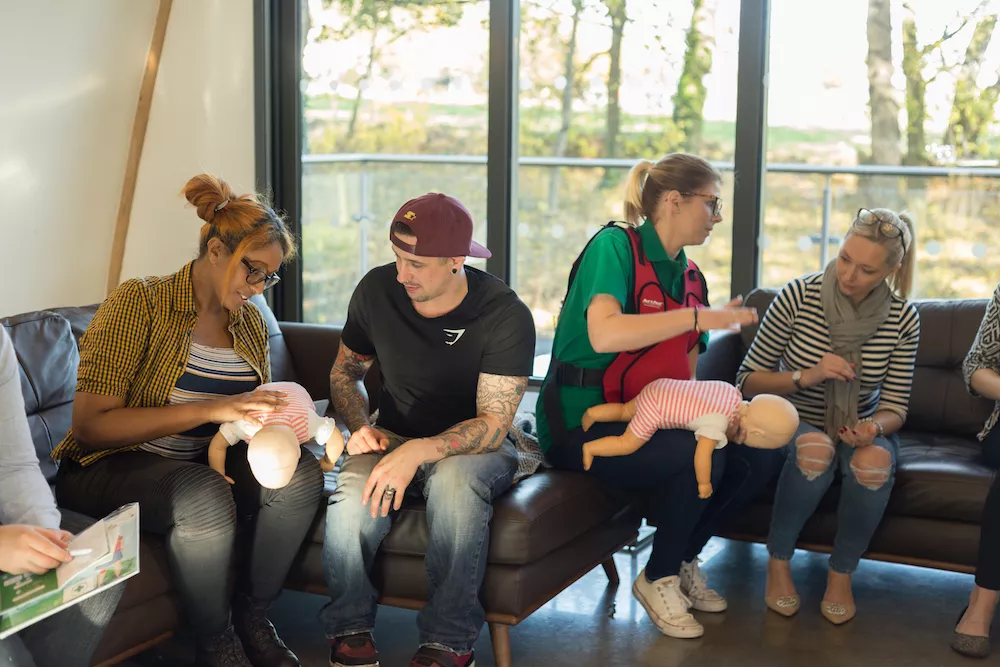GUEST BLOG POST – Mini First Aid’s Top Safety Tips
Blog
8
GUEST BLOG POST – Mini First Aid’s Top Safety Tips
Our friends at Mini First Aid train over 1000 families a week across the UK in baby first aid. We are delighted they are sharing some of their experience and advice with us. Founder (and mum of 6!) Kate over to you.
“When we get ready for baby to arrive, we often focus on the softer side; the nursery, the change bag, the pram, the first outfit. Why not? Having a baby is an exciting time. We then start to think about the birth, how we want things to go and how we plan to feed our baby.
It is hard not to feel nervous as a new parent. Everything is unknown. At Mini First Aid we cannot give you all the magic answers about getting your baby to sleep through the night (we’ll leave that to myHummy!), but we can help you to think about practically equipping yourself for baby, and to think about first aid.”
Here are Mini First Aid’s top tips:
● Attend a baby first aid class. Knowing what to do in an emergency could literally save a life.
● Ask the adults (grandparents and carers) who will be spending time with your baby to also attend a first aid class and don’t forget siblings can attend first aid classes designed for children.
● Make sure you have a first aid kit in your change bag or under your pram and another located at home in the room you spend most of your time in. Make sure that everyone knows where the first aid kit is kept and replenish supplies regularly.
● Where possible, baby proof your home to minimise the risk of accidents.
● Find out which neighbours are at home at particular times of day, so that if you ever need emergency help, you know who you can call on.
● Make sure you know where your nearest Paediatric A&E is located (not all hospitals have one).
And for those parents weaning their babies, the possibility of them choking is really scary. There are also risks with babies putting so many things in their mouths. Make sure you do the following:
● We must show our babies and children that grown-ups eat sitting down, chew properly (!) and that we never put too much in our mouths.
● We never leave a baby or child eating without supervision. Silence is the sign of choking.
● And most importantly make sure you learn how to deal with choking at a first aid class.
Everyone dreads a bump on the head, especially as your baby becomes mobile. Why is it they seem to spend their time bumping into things?! Most bumps are nothing to worry about, but it is better to be cautious, particularly with bumps to the head. Here is what you need to do:
● If your baby bumps his/her head, use a cold compress (either from the fridge or a wet paper towel) and apply to the bump for 10 minutes. During the 10 minutes encourage your baby to rest and relax. For a toddler/young child perhaps read a story so you can monitor them.
● Any signs of sickness, drowsiness, dizziness or any unnatural behaviour could be concussion. You need to take get your baby to A&E as soon as possible.
It is better never to be complacent. Go with your gut instinct. If you are not sure if you need to go to the hospital or if your baby/child is not acting in a way that is normal for them; call 111 for advice on a minor injury or, if life-threatening, call 999.
It is never too early to explain to your baby what is happening if they do get hurt.
You can reassure your child, telling him/her what you are doing: “Mummy is just
going to get you all cleaned up”. If you are confident around medical practitioners
your child(ren) will learn that if they are hurt, whilst they might be in pain; a grown up is going to look after them.
To join a Mini First Aid class visit www.minifirstaid.co.uk.To purchase an award-winning First Aid Kit visit www.minifirstaidshop.co.uk
If you’d like to keep up to date with Mini First Aid why not follow them on Facebook, Instagram or Twitter.
